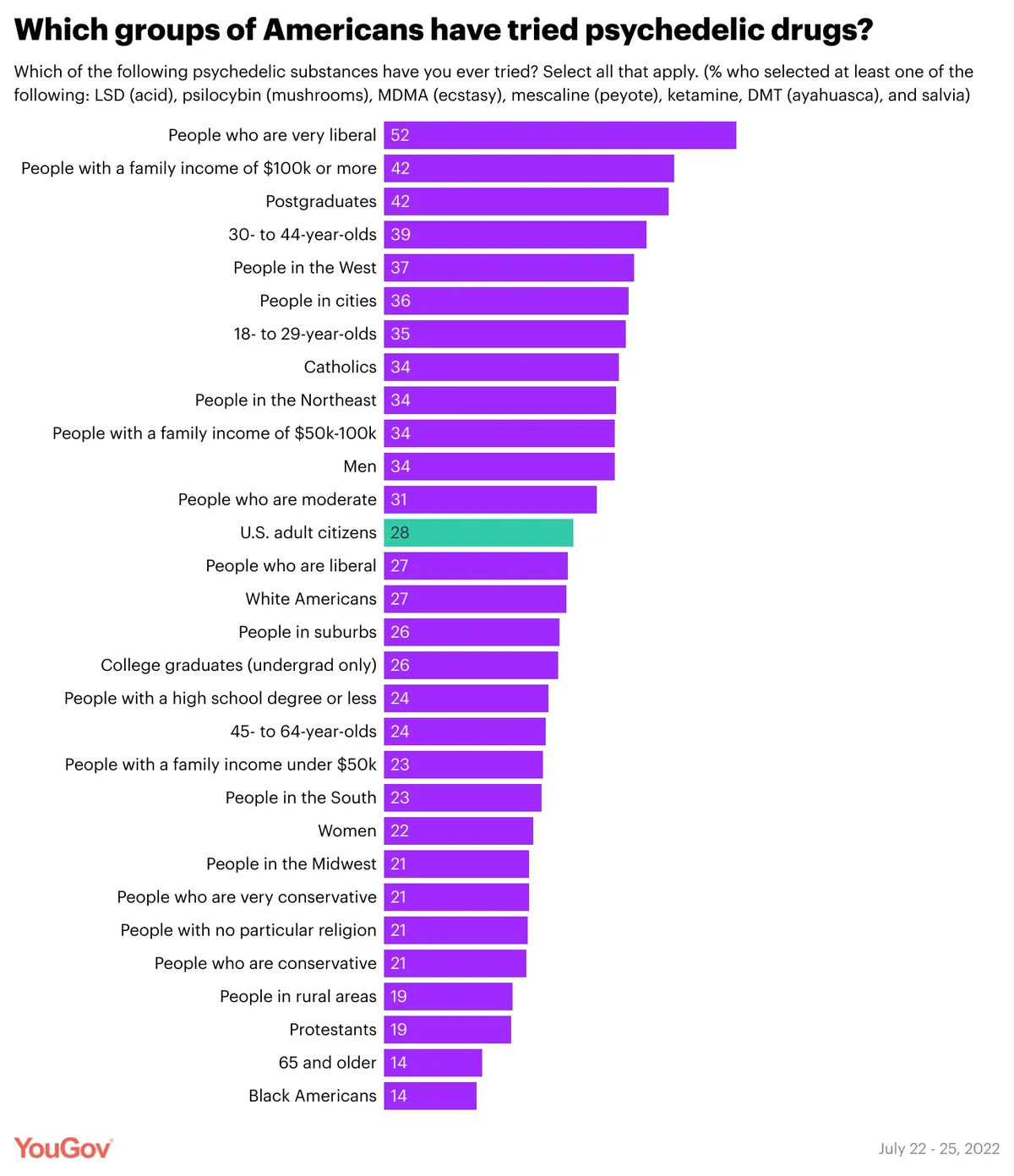Recent shifts, both in policy and public opinion, suggest the tide in the United States may be turning toward increasingly favoring psychedelic drugs. In the past few years, a number of cities across the U.S., such as Oakland, California, have decriminalized psilocybin, also known as psychedelic mushrooms. This November, Coloradans will vote on whether to legalize the drug state-wide, and by January 2023, Oregon is expected to begin allowing its use for mental-health treatment in supervised settings. Recent polling by YouGov finds that at some point in their lives, 28% of Americans have tried at least one of seven psychedelic drugs polled. And while support for legalizing psychedelic drugs is relatively low among Americans overall, it’s much higher among people who have personal experiences with the substances — especially in the case of people who have used mushrooms.
Our latest poll finds that 28% of Americans have used at least one of the seven psychedelic drugs asked about, which are:
- LSD (acid)
- Psilocybin (mushrooms)
- MDMA (ecstasy)
- Mescaline (peyote)
- Ketamine
- DMT
- Salvia
The largest number of Americans report having used LSD (used by 14% of Americans) and psilocybin (used by 13%). Nearly one in 10 Americans say they’ve used MDMA (9%) and mescaline (8%). Fewer say they’ve used ketamine (6%), DMT (6%), or salvia (5%).
Which groups of Americans are more or less likely to have tried psychedelic drugs? Looking across a variety of social and demographic groups, we find that the following identities are most strongly associated with a person having tried at least one of the seven drugs polled:
- People who are very liberal (52% have tried at least one of the psychedelic drugs polled)
- People with a family income of $100,000 or more (42% have tried at least one)
- People with a postgraduate degree (42%)
- 30- to 44-year-olds (39%)
- People who live in the Western U.S. (37%)
Groups analyzed with the lowest propensity of having tried a psychedelic drug include:
- Black Americans (14% have tried at least one of the psychedelic drugs polled)
- Americans 65 and older (14% have tried at least one)
- Protestants (19%)
- People in rural areas (19%)
- People who are conservative (21%)

While efforts to decriminalize psychedelics have made headway in certain parts of the country, Americans overall are more likely to oppose than to support such measures. A significant share also say they’re not sure.
- By 44% to 27%, Americans oppose decriminalizing psilocybin (mushrooms)
- By 53% to 20%, Americans oppose decriminalizing LSD (acid)
- By 53% to 19%, Americans oppose decriminalizing MDMA (ecstasy)
People who have tried these three drugs are more supportive of decriminalizing them. Two-thirds of people who have tried psilocybin (68%) say it should be legal, 43% of people who have tried LSD say it should be legal, and 48% of people who’ve tried MDMA say it should be legal.
There are also regional differences in support for the decriminalization of psychedelics. People who live in the Western U.S. are more likely than people in other regions to support decriminalizing each of mushrooms, acid, and ecstasy, though the gap is especially large in regards to mushrooms.
Recently proposed bipartisan amendments to the annual National Defense Authorization Act, suggested by Reps. Dan Crenshaw and Alexandria Ocasio-Cortez, relax federal restrictions on research into psychedelic-assisted post-traumatic stress disorder (PTSD) treatment for veterans. When asked about it, a majority of Americans (54%) say they support such research, while 18% oppose it. People who’ve tried at least one psychedelic drug are more likely to support the PTSD research (71%) than are people who haven’t (47%). The proposal to expand research into the therapeutic effects of psychedelics is more popular among Americans with a college degree (63% support it) than it is among people without a college degree (49% support it). Support is also divided by party: Democrats (60%) are more likely to favor psychedelic research than are Independents (54%) and Republicans (45%).
– Carl Bialik contributed to this article
This poll was conducted on July 22 - 25, 2022, among 1,000 U.S. adult citizens. Explore more on the methodology and data for this poll.
Image: vgorbash / Getty
Related stories:










